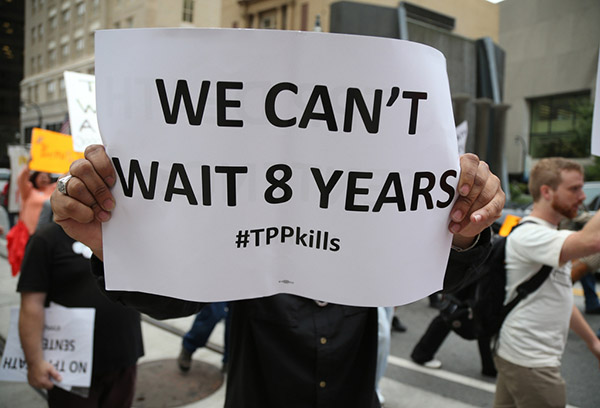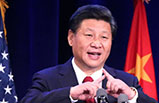Pacific trade ministers reach deal, doubt about approval remains
(Xinhua) Updated: 2015-10-06 09:21
 |
|
Protesters agasint TPP, the Trans-Pacific Partnership initiative, holding a banner "We can't wait 8 years," marching outside the hotel, where the second round of the talks is being held in Atlanta on Oct 1, 2015. [Photo/IC] |
Some influential US lawmakers were also cautious about the final TPP trade agreement announced Monday.
"While the details are still emerging, unfortunately I am afraid this deal appears to fall woefully short," said Orrin Hatch, Chairman of Senate Finance Committee, which has jurisdiction over trade, in a statement. "Over the next several days and months, I will carefully examine the agreement to determine whether our trade negotiators have diligently followed the law so that this trade agreement meets Congress's criteria and increases opportunity for American businesses and workers."
As US President Barack Obama has to notify Congress at least 90 days before he can sign the TPP agreement, it still has a long way to go before the deal reaches US Congress for possible ratification.
"Once negotiators have finalized the text of this partnership, Congress and the American people will have months to read every word before I sign it. I look forward to working with lawmakers from both parties as they consider this agreement," US President Barack Obama said in a statement.
The earliest date for a final TPP vote in US Congress would be in February 2016, when presidential nomination contests kick off in early voting states including Iowa and New Hampshire, according to trade experts at Public Citizen.
Several Republican and Democratic presidential candidates have begun attacking the TPP, raising concerns about potential job losses in the United States. As the TPP could become one of the hot-button issues in the U.S presidential campaign, it will be very difficult for US Congress to pass the trade deal next year. The resignation of US House Speaker John Boehner in late October will make it harder.
Boehner announced later last month he would step down as the House Speaker and leave Congress at the end of October, a move that shocked the Capitol Hill and exposed the deep tensions within the Republican Party.
Boehner played a key role in helping facilitate the passage of trade promotion authority (TPA) earlier this year, which would allow the US president to submit trade deals to Congress for an up-or-down vote without amendments.
The TPP could be voted on expeditiously in Congress next year only if Congressional leaders and the Obama administration work very closely together to craft an implementing legislation for the trade agreement, said Jeffrey Schott, a senior fellow and trade expert at the Washington-based Peterson Institute for International Economics.
"How the successor to Speaker Boehner will work with his counterpart in the Senate and with President Obama is uncertain. That would be a key variable I think in determining how smoothly the TPP moves toward ratification in Congress," he added.
The TPP talks involve Australia, Brunei, Canada, Chile, Japan, Malaysia, Mexico, New Zealand, Peru, Singapore, the United States and Vietnam.
China's Commerce Minister Gao Hucheng said earlier this year that China is open to all the free trade arrangements that are beneficial to the world's trade liberalization and regional economic integration, as long as they are open and transparent.
China will continue to study and assess the impact of the TPP and the Transatlantic Trade and Investment Partnership (TTIP), another free trade agreement under negotiations by the US and European Union, on regional and global levels, and in the meantime pursuing and accelerating China's own free trade zone strategies, said Gao.




